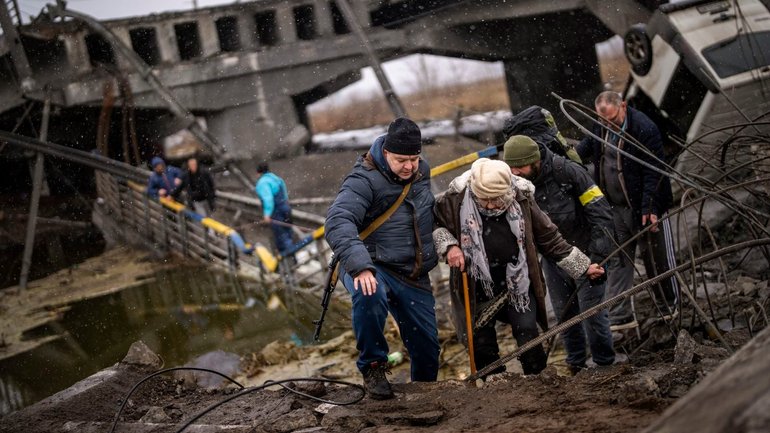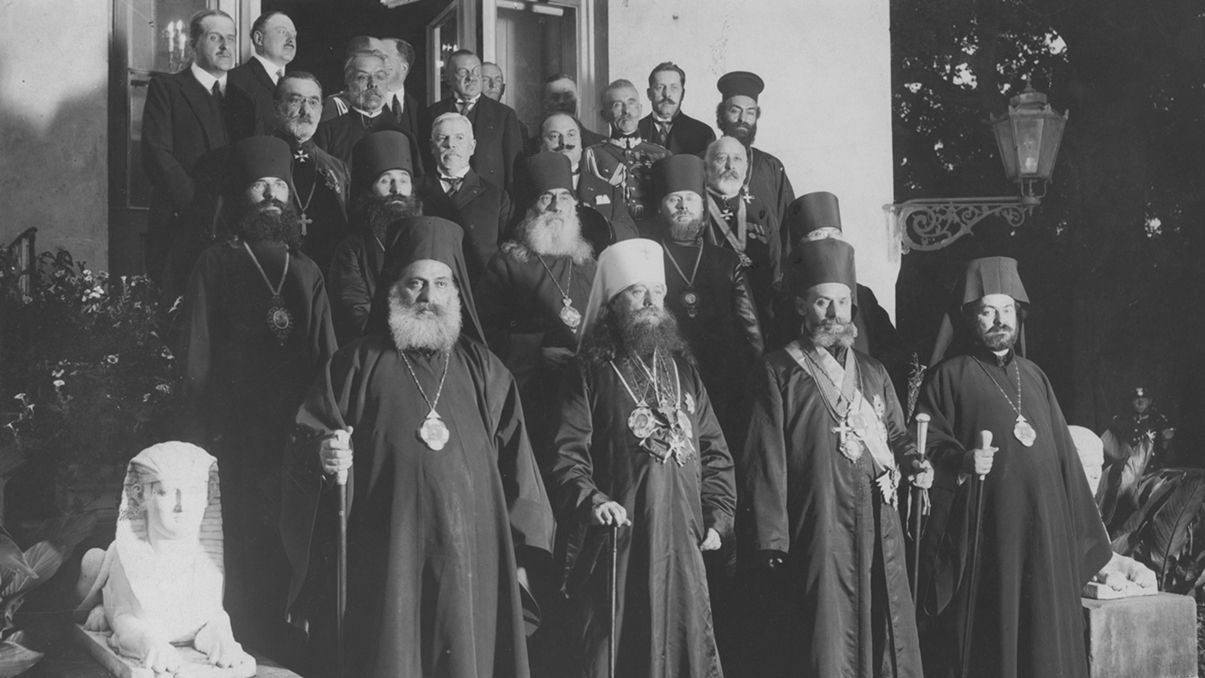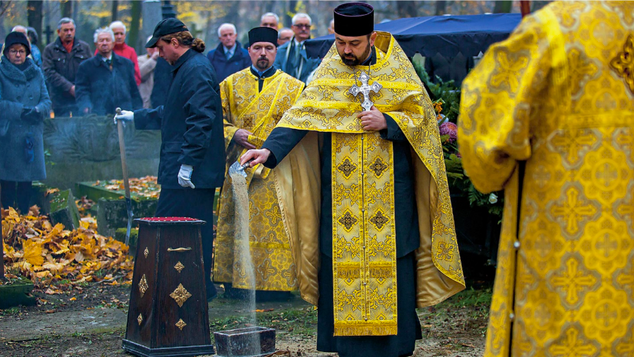
By Pawel P. Wroblewski, head of the Laboratory of Prognostic Research on Religious Change at the Faculty of Social Sciences, University of Wrocław, Poland, and cooperates with the Centre for Doctrine and Training of the Polish Armed Forces in the "NUP 2X35" Campaign.
The Orthodox Church of Poland joins the voices of Orthodox Christians worldwide who have defined a sacralisation of the 'Russky mir' ideology by Patriarch Kirill of Moscow as contrary to the foundations of Christianity, with a fundamentalist and racist background.
The most important words of the communiqué of the Synod of Bishops of the Polish Orthodox Church are as follows:
On 24th February 2022, Russian troops unexpectedly invaded the lands of Ukraine and began hostilities. A difficult time of fratricidal fighting ensued, which continues to this day. As a result, citizens' normal lives were shattered, many innocent people were killed, and church and social life deteriorated. In addition, material goods are destroyed: temples, monuments, critical infrastructure and residential buildings.
War, in itself, is a great experience in the life of societies. Ukraine and all peoples of peace experience great pain; brotherly blood is shed, similar to Abel's blood due to the murder committed by his brother Cain.
Millions of Ukrainian citizens are leaving their homeland. As a result, the nation is suffering, is in turmoil and is lost.
As in the Old Testament and today, God calls out to all participants in warfare: "The voice of your brother's blood cries out to me from the earth" (Genesis 4:10).
The Holy Synod of Bishops of the Polish Autocephalous Orthodox Church, guided by this biblical truth, appeals to the authorities of the Russian Federation, headed by its President, to cease hostilities in Ukraine, viewing them as wicked and incomprehensible. It is difficult to understand why two fraternal, Orthodox and Slavic nations fight each other. Let us not destroy what our Fathers and Mothers have left us, beginning with the baptism of St. Prince Vladimir.
Almost a month after the war began, the lack of a common statement by the Orthodox bishops of Poland has aroused much controversy. The strong expectations of the faithful pointed to the need for the bishops when confronted with the evil that is war, to stop speaking the language of diplomacy and give a simple testimony of the Gospel. The silence of a part of the Polish Orthodox hierarchy has been perceived as in line with the political expectations of the Moscow Patriarchate, which has declared with satisfaction that the local Orthodox churches are taking "a balanced peaceful stance concerning what is happening".
The decisive dissociation of the Polish Orthodox Church from the war aggressor is of high moral significance, also in a spiritual sense: whoever shares his brotherhood with a defaulter of the Gospel "becomes a sharer in his evil deeds" (2 John 1:11). It is not unimportant to distance oneself not only from the barbaric effects of warfare but also from its cause, just as by fighting concrete human sin, Christianity also expels the adversary of the human race. Today's position of the Polish Orthodox bishops stands in opposition to the aggressive language of the representatives of the Moscow Patriarchate, and thus speaks out against, firstly, the instrumentalisation of the language of theology to justify the war and secondly, silence in the face of the tragedy of millions of victims, including the deaths of children.
Ukrainian autocephaly: the Polish Orthodox Church's oblivion of its history
Unfortunately, the current position expressed by the PAOC bishops is not fully in line with the expectations of those Orthodox war refugees from Ukraine who have arrived on Polish territory and recognise the sovereignty of the Kyiv metropolis under the auspices of the Patriarchate of Constantinople. They are deprived of the possibility to receive the Eucharist because the Polish Church, favouring structures subordinate to Moscow, has not yet recognised them as a fully-fledged community. The expected breakthrough in this matter may be brought by the visit of Patriarch Bartholomew of Constantinople to Poland, who has accepted the invitation of Polish President Andrzej Duda to meet with war refugees shortly. Metropolitan Sava extended a separate invitation to the Patriarch.
Moscow, on the other hand, speaks in one breath of war against Ukraine and accuses the Patriarchate of Constantinople of carrying out an 'invasion' of this country: it is shocking and deeply immoral to compare the peaceful efforts for freedom of the Ukrainian Orthodox Church to the Russian Federation's cruel war.
Specialists in Orthodox canon law alert that the Orthodox Church of Poland, by not recognising the Ukrainian autocephaly, undermines its right to autocephaly granted by Constantinople. It is worth recalling that Moscow did not agree to this autocephaly, and there was no clear position of the Orthodox bishops operating on the territory of the reborn Polish state in 1918. Today, independent Ukraine finds itself in a similar situation, and it would seem natural that the Polish Orthodox Church would support it. It is exposed by the position of the Patriarchate of Constantinople, which was the justification for granting administrative independence to the Orthodox Church in Poland in 1924: the tomos unequivocally declared that Moscow's acquisition of the Kyiv metropolis and territories of former Poland and Lithuania was extraordinary and did not entail any resignation from the rights belonging to Constantinople. Therefore, it would be an unacceptable scenario if the Polish Orthodox Church recognised its own autocephaly granted by Moscow in 1948, a formal condition of which was the renunciation of previous ties with Constantinople.

Metropolitan Sava emphasised his desire to settle the dispute over autocephaly in Ukraine under the Orthodox Church's law. At the same time, he deprived Constantinople of the Mother Church's right to determine the rules of canonical reconciliation, including not ordaining bishops once performed. The paradox and uniqueness of this situation lie in the fact that the PAOC recognises the sacraments of other Christian denominations and has not punished its hierarchs for the strictly forbidden offences connected with the so-called intercommunion (e.g. in 1966, Metropolitan Basil of Warsaw was the co-consecrator of an Old Catholic bishop, while in 1994 Archbishop Jeremiah of Wroclaw took an active part in the ordination of a Lutheran bishop). Moscow is equally inconsistent in this assessment since it has repeatedly recognised by economy the ordination of former Roman Catholic clergy members it has accepted into its structure: this means that the Moscow Patriarchate's interpretations of the tomos' reluctance for Ukraine are primarily political.
The reality is arguably even more complex: On 4th May 2018, oligarch Vadym Novinsky, sponsor of many of the works of Patriarch Kirill of Moscow, paid a visit to Metropolitan Sava, accompanying a Ukrainian delegation of the Moscow Patriarchate led by Metropolitan Antony Pakanych of Borispol and Brovary, which took up the issue of autocephaly. A few days later, on 9th May, the bishops of the Polish Orthodox Church opposed for the first time the recognition of autocephaly granted by Constantinople. Ukrainian news services indicated that this was due to Novinsky's "financial investments" in the Polish Church.
In October 2018, Archbishop Jerzy Pankowski of Wroclaw assured at an official meeting with representatives of the Polish government that the Warsaw orthodox church of St Sofia - Wisdom of God "is being built only from the donations of the faithful". At the end of 2021, it turned out that these were also "faithful from Moscow": the equipment of the temple was to be financed by a foundation linked to the Russian nuclear energy agency Rosatom.
Does history go round in circles?
On 21st March, Patriarch Kirill paid tribute to Minister Sergei Lavrov, wishing "God's help and success in (...) hard work for Russia" and reaffirming his commitment to Kremlin war propaganda.
The root of this serious problem lies in the naive and hasty recognition of the Moscow Patriarchate, reorganised by Stalin in 1943, by local Orthodox churches as the legitimate representation of Russian Orthodoxy, while at the same time failing to give due support to the underground and émigré churches. Until 1965, the Moscow Patriarchate was directly supervised by a body subordinate to the Central Committee of the CPSU, replaced by the Council for Religious Affairs under the USSR Cabinet of Ministers, which operated until 1991.
Despite greater religious freedom in Poland in the 1980s, the Communist secret services controlled the activities of 15 of the 26 churches and religious associations. All post-war heads of the Polish Orthodox Church were collaborators with the secret services. Metropolitan Sava of Warsaw, known under the pseudonym "Jurek", was involved in the surveillance of Western denominational organisations (including the World Council of Churches, the International Mixed Commission for the Theological Dialogue between the Catholic Church and the Orthodox Church), disintegration activity and enabling the discredit of persons hostile to the worldview. The KGB coordinated this activity.
Forty years ago in Poland, the totalitarian communist state-imposed martial law to turn against people demanding freedom and democracy. As a result, many people died, and many were imprisoned and persecuted. The Polish Orthodox Church sided with the regime and has not made any synodal act of repentance for this entanglement. In 2015, the burial of General Czeslaw Kiszczak, a communist criminal and declared atheist, took place according to Orthodox ceremonial.

The author is the head of the Laboratory of Prognostic Research on Religious Change at the Faculty of Social Sciences, University of Wrocław, Poland, and cooperates with the Centre for Doctrine and Training of the Polish Armed Forces in the "NUP 2X35" Campaign.

Δεν υπάρχουν σχόλια:
Δημοσίευση σχολίου
Σημείωση: Μόνο ένα μέλος αυτού του ιστολογίου μπορεί να αναρτήσει σχόλιο.